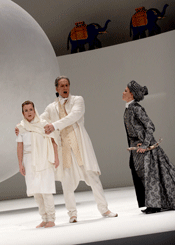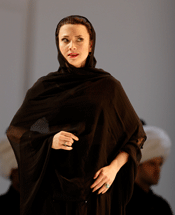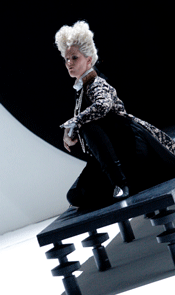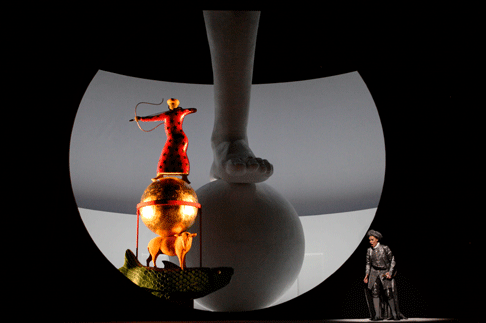Plácido Domingo had been billed to sing five of the seven performances, but
was rushed to hospital days before opening night. Kurt Streit had to step in at
short notice. This is his first Bajazet, although he’s very experienced
and professional. Domingo’s name sells tickets, but his withdrawal
wasn’t an issue for me, sad as the circumstances are, for his Bajazet is
a known quantity. I’d been planning to hear Streit anyway, later in the
run.
Unlike Domingo, Streit is a baroque and Mozart specialist, so he brings a
completely different perspective to the role. Bajazet is not a sympathetic
character. He is used to being an autocrat, whose will is unquestioned:. Suddenly he’s in chains, defeated by “a common herdsman”.
It’s so far beyond his comprehension that he cannot adapt. Suicide
is his only option. It’s a kind of warped autonomy. Because he
can’t learn or change, it’s the only form of self-preservation left
to him.
Streit’s Bajazet is regally dignified. Men like he don’t do
empathy, they rule. This makes the tenderness between father and daughter all
the more poignant. Streit’s Bajazet is perceptive, for Bajazet is
fundamentally isolated by his inability to relate to others. After swallowing
poison, he has nothing to lose, so gives in to feelings. Streit’s calm, magisterial singing at this point conveys the sense that the Ottoman has found sublimation. Being an absolute monarch can be a burden, and perhaps Bajazet at last senses release.
 Christine Schäfer as Asteria, Kurt Streit as Bajazet and Sara Mingardo as Andronico
Christine Schäfer as Asteria, Kurt Streit as Bajazet and Sara Mingardo as Andronico
Tamerlano represents the new order wiping away the old. His costumes
constantly change, a dash of colour against the stark black and white design of
the set. Eventually, Tamerlano appears in full wig and train, like a monarch of
the Ancien Regime. It’s not in the libretto, but a telling
observation, for Tamerlano became a tyrant. Handel didn’t need to spell
this out explicitly, but the implications would not have been lost on him. Full
credit to Graham Vick and his team (Richard Hudson, designs).
This production looks uncompromisingly modern, because Handel’s ideas
are relevant to modern times : power, integrity, loyalty. The lighting (Mathew Richardson) is oppressively bright, but throws the moral issues in the opera into full focus. Because
there’s no unnecessary detail, such details as they are become
significant - rows of anonymous servants, moving in stylized obeisance, like
machines. Great Empires function through rituals like these. Power is
symbolized by a huge foot, bearing down on a sphere which perhaps represents
the world. When Bajazet and Asteria crawl under, it feels dangerous, as it
should be. They’re not crushed by the set but by what it means.
 Renata Pokupić as Irene
Renata Pokupić as Irene
Princess Irene appears astride a huge blue elephant. It’s marvelous
theatre. But power “is” theatre. The elephant looks comic, like an
illustration in a children’s book. But again, there is something faintly
ludicrous about these monarchs handing out kingdoms as if they were candy.
Christine Schäfer is a superb Asteria. It’s her debut in this role,
too, though like Streit, she has extensive experience in Handel and the Baroque.
Indeed, they’ve appeared together, including Partenope
at the Theatre an der Wien. The dynamic between them is good.
Schäfer’s Asteria is so strong that she really comes over as her
father’s daughter. Such ferocity and strength of purpose. From
Schäfer’s diminutive frame emits a voice so coolly resolute, it’s
frightening. The famous “whiteness” of her timbre is ideal.
Virginal as Asteria is, she has integrity. To honour her father, she’d
kill and die. Ostensibly Tamerlano is attracted by her beauty, but her
personality is more than a match for his. Perhaps he’s wise not to marry
her. He’s safer with Irene.
Asteria’s purity is indicated in her simple white dress and pigtails.
She’s a princess from a long line of bluebloods, but rates moral
integrity far higher than worldly power. Irene, in contrast, loves power and
status, which is why she won’t settle for second best. Renata
Pokupić’s Irene makes a grand entrance on the blue elephant, but
spends most of the opera huddled under a black veil. She’s biding her
time. She sang the role in Madrid in 2008, so she sings it with assurance.
 Christianne Stotjin as Tamerlano
Christianne Stotjin as Tamerlano
As Tamerlano, Christianne Stotijn makes a debut both in the role and at the
Royal Opera House. Although she’s well known as a singer, Tamerlano is a
tricky role. Few women can portray a tyrant as butch and as uncouth as
Tamerlano must have been. Possibly more steel in the voice would have helped.
Even though Tamerlano is prepared to spare Asteria, he isn’t a nice
fellow. Acting this part is difficult, as it doesn’t remotely resemble
Stotijn herself. Maybe she’ll distance herself as the run continues and
play it with greater abandon.
Sara Mingardo is new to the Royal Opera House, too, though she sang
Andronico in Madrid. She’s accomplished, but the part is very long and
wordy. Handel wrote the whole opera in 24 days. Perhaps with more stringent
revision he might have reshaped the part so it’s less verbose, so the
singer doesn’t have to stretch herself so far for relatively little purpose. Even Leone, a relatively minor but critical part is sung by a newcomer to the Royal Opera House, Vito Priante.
 Sara Mingardo as Andronico
Sara Mingardo as Andronico
I liked this first night performance for its freshness and immediacy.
If some of the performances were a little tentative, they might mature as the
run continues. But Streit and Schäfer are impressive, making this
“new” Tamerlano a rewarding experience.
Anne Ozorio
![Kurt Streit as Bajazet [Photo by Catherine Ashmore courtesy of Royal Opera House]](http://www.operatoday.com/Bajazet_Streit.gif)



